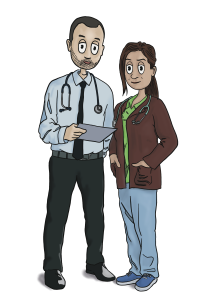Our research project, Mapping Doctors, October 2022-March 2025, explored the relationship between medical training and health inequalities.
 Access to healthcare relies on there being enough doctors in an area to treat patients. There are fewer doctors in some areas, despite the greater healthcare needs of the population, and it affects people’s health because they cannot see a doctor when they need to. The problem of not having enough doctors is known as ‘underdoctoring.’ Some areas struggle to recruit doctors to serve the local population, especially in areas where there are other inequalities, such as people having low incomes, there is high unemployment, poor housing and an unhealthy environment. These inequalities also affect people’s health, and we call them the ‘social causes of poor health’. When we spoke to patients and the public, they agreed that underdoctoring was a concern for them because they had struggled to get appointments with doctors, experienced long waiting times, and travelled long distances for healthcare.
Access to healthcare relies on there being enough doctors in an area to treat patients. There are fewer doctors in some areas, despite the greater healthcare needs of the population, and it affects people’s health because they cannot see a doctor when they need to. The problem of not having enough doctors is known as ‘underdoctoring.’ Some areas struggle to recruit doctors to serve the local population, especially in areas where there are other inequalities, such as people having low incomes, there is high unemployment, poor housing and an unhealthy environment. These inequalities also affect people’s health, and we call them the ‘social causes of poor health’. When we spoke to patients and the public, they agreed that underdoctoring was a concern for them because they had struggled to get appointments with doctors, experienced long waiting times, and travelled long distances for healthcare.
How medical training programmes are organised is important, because we know that where doctors train is a big influence on where they end up working. Several studies have looked into doctors’ careers, often using questionnaires to find information, but we think that there are a lot of factors that influence where doctors work which have not yet been looked into, including how this relates to the social causes of poor health.
We have made a major contribution to addressing underdoctoring. Our study has investigated why doctors work where they work, thinking about how the healthcare system as a whole is organised as well as individual choices. We conducted case studies of three underdoctored areas, and one oversubscribed site. By looking in detail at these areas, we have started to understand more about the differences between places, which has lessons for other areas in the UK as well as the areas we are focusing on.
We will still be posting regular updates on the project on this website and we will be being collating formal publications and other engagement activities on the publications page. You can read full details of the different strands of the project at this page. Our Frequently Asked Questions page also outlines some key issues we often get asked about.
Learn more about all the team and read their profiles at this page.

This study is funded by the NIHR HSDR NIHR134540. The views expressed are those of the author(s) and not necessarily those of the NIHR or the Department of Health and Social Care.
